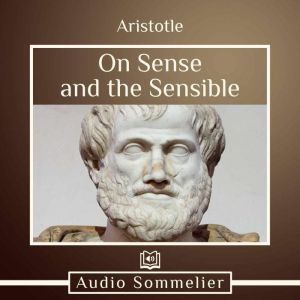

On Sense and the Sensible
Author: Aristotle
Narrator: Suzi Woods
Unabridged: 1 hr 43 min
Format: Digital Audiobook Download
Publisher: Audio Sommelier
Published: 08/27/2018
Categories: Nonfiction, Philosophy


Author: Aristotle
Narrator: Suzi Woods
Unabridged: 1 hr 43 min
Format: Digital Audiobook Download
Publisher: Audio Sommelier
Published: 08/27/2018
Categories: Nonfiction, Philosophy
Aristotle (384-322 BC) was a Greek philosopher, a student of Plato, and a tutor to Alexander the Great. His writings, on such diverse subjects as rhetoric, logic, politics, ethics, biology, physics, and poetry, comprise some of the foundations of Western philosophy. He wrote as many as 200 treatises during his lifetime, of which only 31 survive. Of these, Aristotle's best-known works include Metaphysics, Nicomachean Ethics, Eudemian Ethics, Politics, and On the Soul.
Aristotle starts by analysing some animals attributes, saying that they can be summed up on pairs, like youth and old, life and death. Seems a bit arbitrary to me. He recalls that senses come from the soul through the body, treated on "de anima". Some better considerations are made about what the eye......more
This is a rather short book about sense. We could learn many things here, including the ingredients to make perfume on that age. Sometimes, learning classics not only for the philosophy within, but also we could learn about that age......more
Sense and Sensible by Aristotle translated into English by J. I. Beareis a short treatise on the senses. The work of course has many inaccuracies as can be expected from an Aristotilean view of the senses. The work starts by explaining how the individual senses connect to the objects they detect by......more